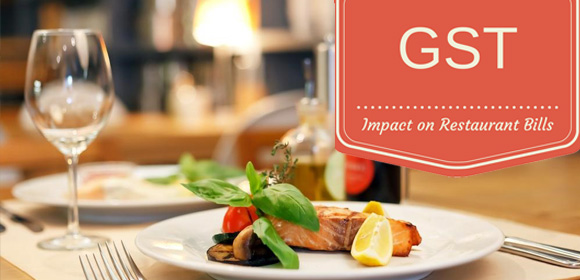
Do you know how GST is important for your company?
Do you know GST will reduce your food and drink Bills?
As we all know GST is the biggest reform proposed in the Indirect tax regime of our country. It is something that each of us must understand as it going to impact our lives significantly. So it is important to carrying out impact studies and to accommodate our business model from current tax regime to new compliance model.
For making a good compliance report you have to kept in mind of all ‘if” and ‘but” of GST. Today we are helping you to analyse the impact of the proposed GST in restaurant sector. Here we try to analyse its possible impact on restaurant industry and to the ultimate consumer. After knowing this, we can find whether “Is it absolution or remission” for our industry.
- Current Regime
In current scenario, restaurant is liable to levy of dual tax as it is considered as both supply of goods and services, attracting cumulative levy of Vat and Service tax of around 20% and if room services is also provided than VAT, service tax and luxury tax combined and go up to 20 to 27%.
If you revisit your food bill form, you’ll find Service Tax, Service Charge, VAT being added over and above the food value.
Generally restaurant bills include three main components i.e. –
1. Service charge
2. VAT
3. Service tax
Service Charge
Every restaurant charge Service tax on their will. There is no rules governing service charge. It is a kind of tip that would be offer to waiters of the restaurant. Most of the restaurant charge 10% of the bill as Service charge. Apart from this service tax and VAT is also applicable to service charge amount.
Service Tax
Service tax is applicable at the rate of 15% (including Krishi Kalyan cess and Swachh Bharat cess). As we all know amount charged by restaurant owners does not constitute only services. So to separate the two components (food and Service), 40% of the cost of item is considered as service cost that makes effective rate of service tax at the rate of 6%.
*Moreover Service tax levy is also depends on whether the restaurant is AC or non AC.
VAT
Another substantial tax is value added tax. Restaurant charge vat on food bill. VAT rate vary from state to state for ex. in Delhi Vat on food items is charged at 12.5%. Apart from this VAT is chargeable on different rates depending on food item. As VAT on Alcoholic beverages is higher than normal rate of tax. As after implementation of GST alcoholic beverages would be liable to levy of sin tax.
For sake of understanding we are providing you brief of all in tabular form-
|
Particular |
Service Tax |
VAT |
|
Food and drink supplied in Restaurants being Air conditioned only |
on 40% of billing amount i.e 6% |
On 100% of billing amount i.e 9% |
|
Food and drink supplied in Restaurants not being Air conditioned. |
NA |
On 100% of billing amount |
|
Food and drink supplied in outdoor catering |
on 60 % of billing amount |
On 100% of billing amount |
- GST impact
The impact of GST on restaurant owner are below:
Registration
Restaurant owners have to apply for registration in every such state from where he make a taxable supply within 30 days of becoming liable to register if they crosses threshold limit of 10,00,000 or 20,00,000 as the case may be, in form GST REG-1.
Rate of Tax
GST bill is proposed to be boosting revenue and simplifies the current tax regime of multiple taxes that also benefit Restaurant Industry. Restaurant may be liable to pay tax on lower rate of 18% as against current rates of VAT and Service tax that cumulatively makes it more than 18%.
In Restaurant they are liable to pay CGST and SGST as most of the supplies of restaurant would be only Intra state supplies.
Input Goods
The overall food cost of the restaurant kitchen is likely to decrease under the new GST regime.
As GST Council have finalise five tier tax structure in proposed GST. Essential items including food, which constitutes about half of the consumer inflation basket as well as major food grains have been exempted from the GST and will be taxed at zero rates.
Input Tax Credit
Presently restaurant are eligible to take input tax credit on goods and utilized them for payment of output tax of VAT and service tax.
Now in GST regime restaurant can avail credit of CGST+SGST on input goods and can utilizes there Input tax credit for making any payment towards output tax. But it is important to note that input tax credit of CGST shall not be utilized for payment of SGST and vice versa.
Conclusion
The GST regime will definitely help the sector in long run. However what will be the immediate effect on restaurant it’s now be unclear because as of now GST law have not covered any specific section for restaurant industry as they are availing abatement exemption in service tax.
Under the GST regime service Tax and VAT amount will be subsumed into one single rate, but you may still find service charge doing rounds in your food bill.





 join For Updates
join For Updates
Hi, I had just gone to a restaurant and we were charged GST along with 10% of service charge. Kindly let me know do we have the mandate to give service charge to the restaurant? Next, in this GST tax system, can service charge be levied along with GST?